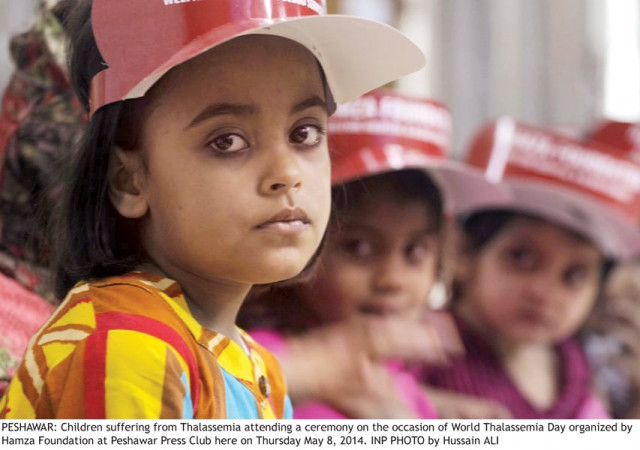Prevention and control
We should begin movement to encourage more young couples to be screened for hereditary diseases including thalassaemia

Between 5,000 and 8,000 children are born with thalassaemia annually, and more than half of them are from K-P. PHOTO: INP
While there is no known data registry kept by the health sector, it is estimated that approximately 5,000 to 6,000 babies are born with thalassaemia every year in the country and nine million children suffer from the disease. In order to mitigate these numbers for the betterment of the nation on the health front, we should begin a movement to encourage more young couples to get screened for hereditary diseases, such as HIV and thalassaemia, so that their future children are not put through the misery of frequent hospital trips and unhappy, abnormal lives.
Taking into account the prevalence of inter-family marriages in Pakistan, there is a dire need for more awareness on thalassaemia and other inheritable diseases. According to one report, inter-family marriages contribute to 44 per cent of thalassaemia cases. By taking preventative measures, adults have some power to ensure that a child is born under healthy circumstances. By completing health tests prior to conceiving or even marriage, couples can know whether their offspring might be born with a debilitating disease. This is not to say that couples — if tested positive for a transmittable disease — must not marry. It is to say that if they are married and decide they want a family, they can be referred to genetic counselling and offered alternative options, such as adoption.
Testing would bring certainty and release families of added financial strains because tests to screen for some diseases are generally less costly than medical treatment for these conditions. For example, thalassaemia patients require frequent blood transfusions, on a monthly basis, which can be an expensive and tedious venture. Another point to consider is that if a child is born with the disease, his or her life expectancy might be shorter, only reaching about 40 years of age in a thalassaemia case.
To facilitate testing for hereditary diseases, there is a need for accessibility through the establishment of free clinics and testing centres. The Punjab thalassaemia prevention programme is a good start, but needs to spread across the other provinces. The recently formed Thalassaemia Federation of Pakistan, an umbrella group of 44 already-existing thalassaemia groups, must make sure to help implement steps towards a healthier nation and not stop its work at the advocacy stage. Likewise, the provincial health departments must work to facilitate testing for other hereditary diseases, such as HIV/AIDS, in both urban and rural areas. This treatment and prevention plan must include genetic counseling, which should be initiated in hospitals and clinics across the country, including the rural areas. While the Ministry of Health began a national AIDS control programme, this needs follow-up and greater visibility across the provinces, in both rural and urban areas. Risk screening for pregnant women should be made mandatory. The AIDS control programme is a strong initiative and if executed with diligence, can achieve its goals, paving the way for other prevention programmes and interventions to be developed.
To date, Sindh is the only province to pass a bill to fight thalassaemia. However, like with many other bills passed, there is no implementation. The province must mandate testing for commonly-known hereditary diseases afflicting the Pakistani population prior to marriage. Through careful family planning, couples would provide a social service for the welfare of the nation. Other provincial health departments should follow suit and propose this bill to control the health problems right at the start, through blood and genetic testing. The recent media attention on World Thalassaemia Day is all well and good but let’s hope the challenge posed to us by the disease (and other hereditary diseases) is not forgotten as the occasion passes.
Published in The Express Tribune, May 11th, 2014.
Like Opinion & Editorial on Facebook, follow @ETOpEd on Twitter to receive all updates on all our daily pieces.















COMMENTS
Comments are moderated and generally will be posted if they are on-topic and not abusive.
For more information, please see our Comments FAQ